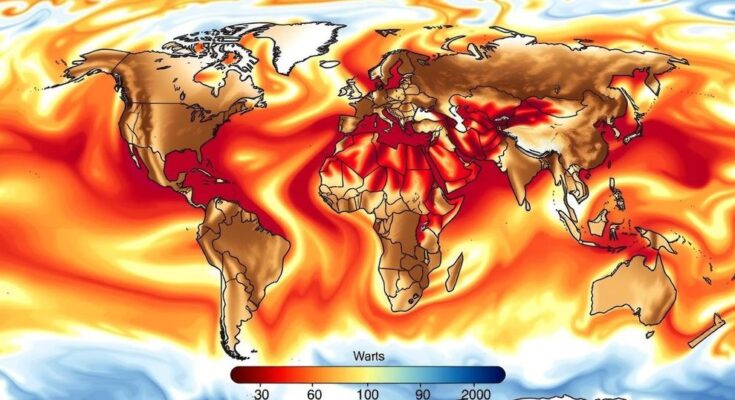November 2024 marks the second-warmest November on record, suggesting that 2024 could be the hottest year ever. Global average temperatures rose 0.14 degrees Celsius compared to last year, and the year is on track to exceed 1.5 degrees Celsius above pre-industrial levels. Experts emphasize the need for urgent climate action due to the rapid pace of temperature changes and their severe impacts on ecosystems and agriculture.
December 2024 is characterized as having the second-highest average global temperatures for November on record, trailing only behind the heat experienced in November 2023. Climate scientists, including those from the European climate service Copernicus, predict that 2024 is likely to culminate in the highest average annual temperatures ever recorded. Following a notably warm summer, with cities like Phoenix enduring extreme heat for over three months, the data supports this alarming trend.
Global temperatures during November averaged at approximately 14.10 degrees Celsius (57.38 degrees Fahrenheit), surpassing the average temperatures from the previous year by 0.14 degrees Celsius (0.25 degrees Fahrenheit). This year is anticipated to be the first in history where average temperatures exceed 1.5 degrees Celsius (2.7 degrees Fahrenheit) above pre-industrial levels.
Despite not breaching the Paris Agreement, which aims to limit human-induced warming to 2 degrees Celsius, the situation accelerates the urgency for substantial climate action. The alarming findings underscore the fast pace of climate change, which significantly disrupts ecosystems and endangers agricultural productivity due to diminishing pollinator populations.
Ongoing universal warming is contributing to heat waves and diminishing sea ice, with Antarctic sea ice recorded at a staggering 10% below average in November. Scientific experts speculate that the recent temperatures could be attributed to El Niño effects, which have caused warmer ocean waters, prompting more heat to be released into the atmosphere, while the usual cooling patterns of preceding La Niña have not materialized this year.
Experts express grave concerns regarding the speed of climate change, indicating that the rapid alterations may lead to increased extinction rates among various species and jeopardize coastal communities due to rising sea levels.
The relationship between climate phenomena such as El Niño and La Niña plays a significant role in global temperature variations. The Copernicus Climate Service has been monitoring these changes, revealing alarming trends in temperature increases and their potential effects on the environment. This context is crucial for understanding why 2024 may be setting records for heat, as temperatures rise due to a combination of human action and natural climatic events. The implications of these changes threaten not only biodiversity but also human livelihoods globally, necessitating an urgent response from all sectors.
In summary, the recent report highlights that November 2024 has been recorded as the second-warmest November, pointing towards an inevitable trend that suggests 2024 could emerge as the hottest year documented. The data underpin the urgent need for decisive climate action to mitigate the catastrophic impacts of rising global temperatures, particularly as human activities continue to intensify climate change. The escalating consequences for ecosystems and human populations underline the critical situation we face in addressing the climate crisis swiftly and effectively.
Original Source: apnews.com




